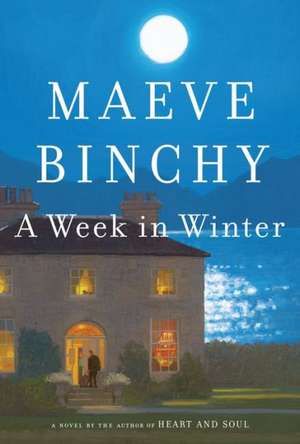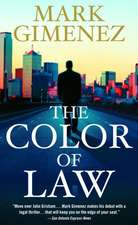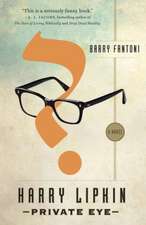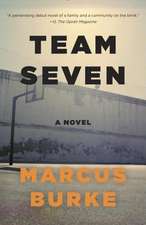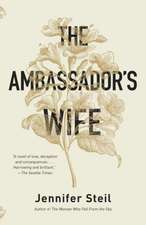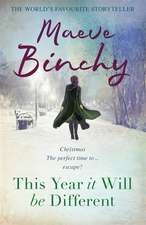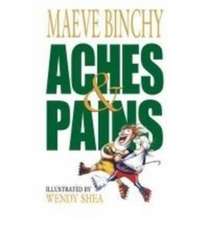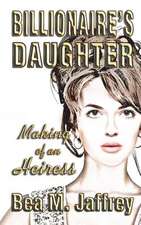A Week in Winter
Autor Maeve Binchyen Limba Engleză Paperback – 13 noi 2013
Stoneyville is a small town on the coast of Ireland where all the families know each other. When Chicky decides to take an old decaying mansion, Stone House, and turn it into a restful place for a holiday by the sea, the town thinks she is crazy. She is helped by Rigger (a bad boy turned good who is handy around the place) and her niece Orla (a whiz at business). Finally the first week of paying guests arrive: John, the American movie star thinks he has arrived incognito; Winnie and Lillian, forced into taking a holiday together; Nuala and Henry, husband and wife, both doctors who have been shaken by seeing too much death; Anders, the Swedish boy, hates his father's business, but has a real talent for music; Miss Nell Howe, a retired school teacher, who criticizes everything and leaves a day early, much to everyone's relief; the Walls who have entered in 200 contests (and won everything from a microwave oven to velvet curtains, including the week at Stone House); and Freda, the psychic who is afraid of her own visions. You will laugh and cry as you spend the week with this odd group who share their secrets and might even have some of their dreams come true.
| Toate formatele și edițiile | Preț | Express |
|---|---|---|
| Paperback (4) | 50.89 lei 3-5 săpt. | +28.40 lei 5-11 zile |
| Orion Publishing Group – 29 dec 2022 | 50.89 lei 3-5 săpt. | +28.40 lei 5-11 zile |
| Anchor Books – 29 noi 2016 | 57.76 lei 3-5 săpt. | +8.41 lei 5-11 zile |
| Anchor Books – 6 ian 2014 | 100.01 lei 3-5 săpt. | |
| Large Print Press – 13 noi 2013 | 112.55 lei 3-5 săpt. |
Preț: 112.55 lei
Nou
Puncte Express: 169
Preț estimativ în valută:
21.54€ • 22.40$ • 17.78£
21.54€ • 22.40$ • 17.78£
Carte disponibilă
Livrare economică 24 martie-07 aprilie
Preluare comenzi: 021 569.72.76
Specificații
ISBN-13: 9781594136658
ISBN-10: 1594136653
Pagini: 525
Dimensiuni: 139 x 216 x 27 mm
Greutate: 0.7 kg
Ediția:Text mare
Editura: Large Print Press
ISBN-10: 1594136653
Pagini: 525
Dimensiuni: 139 x 216 x 27 mm
Greutate: 0.7 kg
Ediția:Text mare
Editura: Large Print Press
Notă biografică
Maeve Binchy is the author of numerous best-selling books, including her most recent novels, Minding Frankie, Heart and Soul, and Whitethorn Woods, as well as Circle of Friends and Tara Road, which was an Oprah’s Book Club selection. She has written for Gourmet; O, The Oprah Magazine; Modern Maturity; and Good Housekeeping, among other publications. Married to Gordon Snell, she lived in Dalkey, Ireland, until her death in July 2012 at the age of seventy-two, shortly after finishing this book.
Extras
Excerpted from the Hardcover Edition
Chicky
Everyone had their own job to do on the Ryans’ farm in Stoneybridge. The boys helped their father in the fields, mending fences, bringing the cows back to be milked, digging drills of potatoes; Mary fed the calves, Kathleen baked the bread, and Geraldine did the hens.
Not that they ever called her Geraldine—she was “Chicky” as far back as anyone could remember. A serious little girl pouring out meal for the baby chickens or collecting the fresh eggs each day, always saying “chuck, chuck, chuck” soothingly into the feathers as she worked. Chicky had names for all the hens, and no one could tell her when one had been taken to provide a Sunday lunch. They always pretended it was a shop chicken, but Chicky always knew.
Stoneybridge was a paradise for children during the summer, but summer in the West of Ireland was short, and most of the time it was wet and wild and lonely on the Atlantic coast. Still, there were caves to explore, cliffs to climb, birds’ nests to discover, and wild sheep with great curly horns to investigate. And then there was Stone House. Chicky loved to play in its huge overgrown garden. Sometimes the Miss Sheedys, three sisters who owned the house and were ancient, let her play at dressing up in their old clothes.
Chicky watched as Kathleen went off to train to be a nurse in a big hospital in Wales, and then Mary got a job in an insurance office. Neither of those jobs appealed to Chicky at all, but she would have to do something. The land wouldn’t support the whole Ryan family. Two of the boys had gone to serve their time in business in big towns in the West. Only Brian would work with his father.
Chicky’s mother was always tired and her father always worried. They were relieved when Chicky got a job in the knitting factory. Not as a machinist or home knitter but in the office. She was in charge of sending out the finished garments to customers and keeping the books. It wasn’t a great job but it did mean that she could stay at home, which was what she wanted. She had plenty of friends around the place, and each summer she fell in love with a different O’Hara boy but nothing ever came of it.
Then one day Walter Starr, a young American, wandered into the knitting factory wanting to buy an Aran sweater. Chicky was instructed to explain to him that the factory was not a retail outlet, they only made up sweaters for stores or mail order.
“Well, you’re missing a trick then,” Walter Starr said. “People come to this wild place and they need an Aran sweater, and they need it now, not in a few weeks’ time.”
He was very handsome. He reminded her of how Jack and Bobby Kennedy had looked when they were boys, same flashing smile and good teeth. He was suntanned and very different from the boys around Stoneybridge. She didn’t want him to leave the knitting factory and he didn’t seem to want to go either.
Chicky remembered a sweater they had in stock, which they had used to be photographed. Perhaps Walter Starr might like to buy that one—it wasn’t exactly new but it was nearly new.
He said it would be perfect.
He invited her to go for a walk on the beach, and he told her this was one of the most beautiful places on earth.
Imagine! He had been to California and Italy and yet he thought Stoneybridge was beautiful.
And he thought Chicky was beautiful too. He said she was just so cute with her dark curly hair and her big blue eyes. They spent every possible moment together. He had intended to stay only a day or two, but now he found it hard to go on anywhere else. Unless she would come with him, of course.
Chicky laughed out loud at the idea that she should pack in her job at the knitting factory and tell her mother and father that she was going around Ireland hitchhiking with an American that she had just met! It would have been more acceptable to suggest flying to the moon.
Walter found her horror at the idea touching and almost endearing.
“We only have one life, Chicky. They can’t live it for us. We have to live it ourselves. Do you think my parents want me out here in the wilds of nowhere, having a good time? No, they want me in the country club playing tennis with the daughters of nice families, but, hey, this is where I want to be. It’s as simple as that.”
Walter Starr lived in a world where everything was simple. They loved each other, so what was more natural than to make love? They each knew the other was right, so why complicate their lives by fretting over what other people would say or think or do? A kindly God understood love. Father Johnson, who had taken a vow never to fall in love, didn’t. They didn’t need any stupid contracts or certificates, did they?
And after six glorious weeks, when Walter had to think of going back to the States, Chicky was ready to go with him. It involved an immense amount of rows and dramas and enormous upset in the Ryan household. But Walter was unaware of any of this.
Chicky’s father was more worried than ever now because everyone would say that he had brought up a tramp who was no better than she should be.
Chicky’s mother looked more tired and disappointed than ever, and said only God and his sainted mother knew what she had done wrong in bringing Chicky up to be such a scourge to them all.
Kathleen said that it was just as well she had an engagement ring on her finger because no man would have her if he knew the kind of family she came from.
Mary, who worked in the insurance office and was walking out with one of the O’Haras, said that the days of her romance were now numbered, thanks to Chicky. The O’Haras were a very respectable family in the town, and they wouldn’t think kindly about this behavior at all.
Her brother Brian kept his head down and said nothing at all. When Chicky asked him what he thought, Brian said he didn’t think. He didn’t have time to think.
Chicky’s friends—Peggy, who also worked in the knitting factory, and Nuala, who was a maid for the three Miss Sheedys—said it was the most exciting, reckless thing they had ever heard of, and wasn’t it great that she had a passport already from that school trip to Lourdes.
Walter Starr said they would stay in New York with friends of his. He was going to drop out of law school—it wasn’t really right for him. If we had several lives, well then, yes, maybe, but since we only have one life it wasn’t worth spending it studying law.
The night before she left, Chicky tried to make her parents understand her feelings She was twenty, she had her whole life to live, she wanted to love her family and for them to love her in spite of their disappointment.
Her father’s face was tight and hard. She would never be welcome in this house again, she had brought shame on them all.
Her mother was bitter. She said that Chicky was being very, very foolish. It wouldn’t last, it couldn’t last. It was not love, it was infatuation. If this Walter really loved her, then he would wait for her and provide her with a home and his name and a future instead of all this nonsense.
You could cut the atmosphere in the Ryan household with a knife.
Chicky’s sisters were no support. But she was adamant. They hadn’t known real love. She was not going to change her plans. She had her passport. She was going to go to America.
“Wish me well,” she had begged them the night before she left, but they had turned their faces away.
“Don’t let me go away with the memory of you being so cold.” Chicky had tears running down her face.
Her mother sighed a great sigh. “It would be cold if we just said, ‘Go ahead, enjoy yourself.’ We are trying to do our best for you. To help you make the best of your life. This is not love, it’s only some sort of infatuation. There’s no use pretending. You can’t have our blessing. It’s just not there for you.”
So Chicky left without it.
At Shannon Airport there were crowds waving good-bye to their children setting out for a new life in the United States. There was nobody to wave Chicky good-bye, but she and Walter didn’t care. They had their whole life ahead of them.
No rules, no doing the right thing to please the neighbors and relations.
They would be free—free to work where they wanted and at what they wanted.
No trying to fulfill other people’s hopes—to marry a rich farmer, in Chicky’s case, or to become a top lawyer, which was what Walter’s family had in mind for him.
Walter’s friends were welcoming in the big apartment in Brooklyn. Young people, friendly and easygoing. Some worked in bookshops, some in bars. Others were musicians. They came and went easily. Nobody made any fuss. It was so very different from home. A couple came in from the Coast, and a girl from Chicago who wrote poetry. There was a Mexican boy who played the guitar in Latino bars.
Everyone was so relaxed. Chicky found it amazing. Nobody made any demands. They would make a big chili for supper with everyone helping. There was no pressure.
They sighed a bit about their families not understanding anything, but it didn’t weigh heavily on anyone. Soon Chicky felt Stoneybridge fade away a little. However, she wrote a letter home every week. She had decided from the outset that she would not be the one to keep a feud going.
If one side behaved normally, then sooner or later the other side would have to respond and behave normally as well.
She did hear from some of her friends, and had the odd bit of news from them. Peggy and Nuala wrote and told her about life back home; it didn’t seem to have changed much in any way at all. So she was able to write to say she was delighted about the plans for Kathleen’s wedding to Mikey, and did not mention that she had heard about Mary’s romance with Sonny O’Hara having ended.
Her mother wrote brisk little cards, asking whether she had fixed a date for her wedding yet and wondering about whether there were Irish priests in the parish.
She told them nothing about the communal life she lived in the big crowded apartment, with all the coming and going and guitar playing. They would never have been able to begin to understand.
Instead, she wrote about going to art-exhibit openings and theater first nights. She read about these in the papers, and sometimes indeed she and Walter went to matinees or got cheap seats at previews through friends of friends who wanted to fill a house.
Walter had a job helping to catalog a library for some old friends of his parents. His family had hoped to woo him back this way to some form of academic life, he said, and it wasn’t a bad job. They left him alone and didn’t give him any hassle. That’s all anyone wanted in life.
Chicky learned that this was definitely all Walter wanted in life. So she didn’t nag him about when she would meet his parents, or when they would find a place of their own, or indeed what they would do down the line. They were together in New York. That was enough, wasn’t it?
And in many ways it was.
Chicky got herself a job in a diner. The hours suited her. She could get up very early, leave the apartment before anyone else was awake. She helped open up the diner, did her shift and served breakfasts. She was back at the apartment before the others had struggled into the day, bringing them cold milk and bagels left over from the diner’s breakfast stock. They got used to her bringing them their supplies. She still heard news from home but it became more and more remote.
Chicky
Everyone had their own job to do on the Ryans’ farm in Stoneybridge. The boys helped their father in the fields, mending fences, bringing the cows back to be milked, digging drills of potatoes; Mary fed the calves, Kathleen baked the bread, and Geraldine did the hens.
Not that they ever called her Geraldine—she was “Chicky” as far back as anyone could remember. A serious little girl pouring out meal for the baby chickens or collecting the fresh eggs each day, always saying “chuck, chuck, chuck” soothingly into the feathers as she worked. Chicky had names for all the hens, and no one could tell her when one had been taken to provide a Sunday lunch. They always pretended it was a shop chicken, but Chicky always knew.
Stoneybridge was a paradise for children during the summer, but summer in the West of Ireland was short, and most of the time it was wet and wild and lonely on the Atlantic coast. Still, there were caves to explore, cliffs to climb, birds’ nests to discover, and wild sheep with great curly horns to investigate. And then there was Stone House. Chicky loved to play in its huge overgrown garden. Sometimes the Miss Sheedys, three sisters who owned the house and were ancient, let her play at dressing up in their old clothes.
Chicky watched as Kathleen went off to train to be a nurse in a big hospital in Wales, and then Mary got a job in an insurance office. Neither of those jobs appealed to Chicky at all, but she would have to do something. The land wouldn’t support the whole Ryan family. Two of the boys had gone to serve their time in business in big towns in the West. Only Brian would work with his father.
Chicky’s mother was always tired and her father always worried. They were relieved when Chicky got a job in the knitting factory. Not as a machinist or home knitter but in the office. She was in charge of sending out the finished garments to customers and keeping the books. It wasn’t a great job but it did mean that she could stay at home, which was what she wanted. She had plenty of friends around the place, and each summer she fell in love with a different O’Hara boy but nothing ever came of it.
Then one day Walter Starr, a young American, wandered into the knitting factory wanting to buy an Aran sweater. Chicky was instructed to explain to him that the factory was not a retail outlet, they only made up sweaters for stores or mail order.
“Well, you’re missing a trick then,” Walter Starr said. “People come to this wild place and they need an Aran sweater, and they need it now, not in a few weeks’ time.”
He was very handsome. He reminded her of how Jack and Bobby Kennedy had looked when they were boys, same flashing smile and good teeth. He was suntanned and very different from the boys around Stoneybridge. She didn’t want him to leave the knitting factory and he didn’t seem to want to go either.
Chicky remembered a sweater they had in stock, which they had used to be photographed. Perhaps Walter Starr might like to buy that one—it wasn’t exactly new but it was nearly new.
He said it would be perfect.
He invited her to go for a walk on the beach, and he told her this was one of the most beautiful places on earth.
Imagine! He had been to California and Italy and yet he thought Stoneybridge was beautiful.
And he thought Chicky was beautiful too. He said she was just so cute with her dark curly hair and her big blue eyes. They spent every possible moment together. He had intended to stay only a day or two, but now he found it hard to go on anywhere else. Unless she would come with him, of course.
Chicky laughed out loud at the idea that she should pack in her job at the knitting factory and tell her mother and father that she was going around Ireland hitchhiking with an American that she had just met! It would have been more acceptable to suggest flying to the moon.
Walter found her horror at the idea touching and almost endearing.
“We only have one life, Chicky. They can’t live it for us. We have to live it ourselves. Do you think my parents want me out here in the wilds of nowhere, having a good time? No, they want me in the country club playing tennis with the daughters of nice families, but, hey, this is where I want to be. It’s as simple as that.”
Walter Starr lived in a world where everything was simple. They loved each other, so what was more natural than to make love? They each knew the other was right, so why complicate their lives by fretting over what other people would say or think or do? A kindly God understood love. Father Johnson, who had taken a vow never to fall in love, didn’t. They didn’t need any stupid contracts or certificates, did they?
And after six glorious weeks, when Walter had to think of going back to the States, Chicky was ready to go with him. It involved an immense amount of rows and dramas and enormous upset in the Ryan household. But Walter was unaware of any of this.
Chicky’s father was more worried than ever now because everyone would say that he had brought up a tramp who was no better than she should be.
Chicky’s mother looked more tired and disappointed than ever, and said only God and his sainted mother knew what she had done wrong in bringing Chicky up to be such a scourge to them all.
Kathleen said that it was just as well she had an engagement ring on her finger because no man would have her if he knew the kind of family she came from.
Mary, who worked in the insurance office and was walking out with one of the O’Haras, said that the days of her romance were now numbered, thanks to Chicky. The O’Haras were a very respectable family in the town, and they wouldn’t think kindly about this behavior at all.
Her brother Brian kept his head down and said nothing at all. When Chicky asked him what he thought, Brian said he didn’t think. He didn’t have time to think.
Chicky’s friends—Peggy, who also worked in the knitting factory, and Nuala, who was a maid for the three Miss Sheedys—said it was the most exciting, reckless thing they had ever heard of, and wasn’t it great that she had a passport already from that school trip to Lourdes.
Walter Starr said they would stay in New York with friends of his. He was going to drop out of law school—it wasn’t really right for him. If we had several lives, well then, yes, maybe, but since we only have one life it wasn’t worth spending it studying law.
The night before she left, Chicky tried to make her parents understand her feelings She was twenty, she had her whole life to live, she wanted to love her family and for them to love her in spite of their disappointment.
Her father’s face was tight and hard. She would never be welcome in this house again, she had brought shame on them all.
Her mother was bitter. She said that Chicky was being very, very foolish. It wouldn’t last, it couldn’t last. It was not love, it was infatuation. If this Walter really loved her, then he would wait for her and provide her with a home and his name and a future instead of all this nonsense.
You could cut the atmosphere in the Ryan household with a knife.
Chicky’s sisters were no support. But she was adamant. They hadn’t known real love. She was not going to change her plans. She had her passport. She was going to go to America.
“Wish me well,” she had begged them the night before she left, but they had turned their faces away.
“Don’t let me go away with the memory of you being so cold.” Chicky had tears running down her face.
Her mother sighed a great sigh. “It would be cold if we just said, ‘Go ahead, enjoy yourself.’ We are trying to do our best for you. To help you make the best of your life. This is not love, it’s only some sort of infatuation. There’s no use pretending. You can’t have our blessing. It’s just not there for you.”
So Chicky left without it.
At Shannon Airport there were crowds waving good-bye to their children setting out for a new life in the United States. There was nobody to wave Chicky good-bye, but she and Walter didn’t care. They had their whole life ahead of them.
No rules, no doing the right thing to please the neighbors and relations.
They would be free—free to work where they wanted and at what they wanted.
No trying to fulfill other people’s hopes—to marry a rich farmer, in Chicky’s case, or to become a top lawyer, which was what Walter’s family had in mind for him.
Walter’s friends were welcoming in the big apartment in Brooklyn. Young people, friendly and easygoing. Some worked in bookshops, some in bars. Others were musicians. They came and went easily. Nobody made any fuss. It was so very different from home. A couple came in from the Coast, and a girl from Chicago who wrote poetry. There was a Mexican boy who played the guitar in Latino bars.
Everyone was so relaxed. Chicky found it amazing. Nobody made any demands. They would make a big chili for supper with everyone helping. There was no pressure.
They sighed a bit about their families not understanding anything, but it didn’t weigh heavily on anyone. Soon Chicky felt Stoneybridge fade away a little. However, she wrote a letter home every week. She had decided from the outset that she would not be the one to keep a feud going.
If one side behaved normally, then sooner or later the other side would have to respond and behave normally as well.
She did hear from some of her friends, and had the odd bit of news from them. Peggy and Nuala wrote and told her about life back home; it didn’t seem to have changed much in any way at all. So she was able to write to say she was delighted about the plans for Kathleen’s wedding to Mikey, and did not mention that she had heard about Mary’s romance with Sonny O’Hara having ended.
Her mother wrote brisk little cards, asking whether she had fixed a date for her wedding yet and wondering about whether there were Irish priests in the parish.
She told them nothing about the communal life she lived in the big crowded apartment, with all the coming and going and guitar playing. They would never have been able to begin to understand.
Instead, she wrote about going to art-exhibit openings and theater first nights. She read about these in the papers, and sometimes indeed she and Walter went to matinees or got cheap seats at previews through friends of friends who wanted to fill a house.
Walter had a job helping to catalog a library for some old friends of his parents. His family had hoped to woo him back this way to some form of academic life, he said, and it wasn’t a bad job. They left him alone and didn’t give him any hassle. That’s all anyone wanted in life.
Chicky learned that this was definitely all Walter wanted in life. So she didn’t nag him about when she would meet his parents, or when they would find a place of their own, or indeed what they would do down the line. They were together in New York. That was enough, wasn’t it?
And in many ways it was.
Chicky got herself a job in a diner. The hours suited her. She could get up very early, leave the apartment before anyone else was awake. She helped open up the diner, did her shift and served breakfasts. She was back at the apartment before the others had struggled into the day, bringing them cold milk and bagels left over from the diner’s breakfast stock. They got used to her bringing them their supplies. She still heard news from home but it became more and more remote.
Recenzii
“Fittingly, this posthumously published work by Ireland’s beloved lady of letters is itself a love letter to her homeland. . . Binchy offers a final chance to enjoy her winning characters and the charm of Irish culture. . . Reading this novel is like ducking out of a cold rain into a fire-warmed pub filled with laughter.” —People
“Lovely. . . Tailor-made for an afternoon jaunt through the backcountry of western Ireland. . . Binchy’s last novel radiates the warmth and charm that fans of the late Irish author will recognize and relish. . . . [her] prose is conversational, comfortable and populated with a cast of colorful characters that run the gamut from droll to dry. . . a delightful diversion.” —Mary Cadden, USA Today
“A hopeful, loving novel chronicling lives shaped by good deeds, small favors, and honest counsel along the rocky crags of the Irish coast. Fans of Binchy and newcomers to her work alike should consider themselves fortunate to have been left such a clear-eyed and open-hearted final gift.” —The Daily Beast
“A Week in Winter goes perfectly with a cup of tea. . . . a gratifying, blustery read full of rich characters, a sea-spray setting and a compelling plot that carries the reader from start to end. . . . Binchy has created a book that envelops its reader in the same calming serenity that Stone House provides its inhabitants.” —Shelly Walston, The Wichita Eagle
“A treat as rich as a box of chocolates.” —aarp.org
“The late great Binchy’s last novel is an appropriately heartwarming and spirit restoring swan song. In classic Binchy-style, the gentle story is populated with a large cast of often eccentric, always endearing characters. . . Stone House, a country inn on the West Coast of Ireland serves as the cozy setting for these interrelated tales of love, loss, friendship, and community. . . . Pour yourself a cup of tea, put your feet up, and prepare to savor this bit of comfort food for the soul.” —Booklist
“Classic Binchy. . . her fans will find solace as hearts mend and relationships sort themselves out one last time.” —Kirkus
“Lovely. . . Tailor-made for an afternoon jaunt through the backcountry of western Ireland. . . Binchy’s last novel radiates the warmth and charm that fans of the late Irish author will recognize and relish. . . . [her] prose is conversational, comfortable and populated with a cast of colorful characters that run the gamut from droll to dry. . . a delightful diversion.” —Mary Cadden, USA Today
“A hopeful, loving novel chronicling lives shaped by good deeds, small favors, and honest counsel along the rocky crags of the Irish coast. Fans of Binchy and newcomers to her work alike should consider themselves fortunate to have been left such a clear-eyed and open-hearted final gift.” —The Daily Beast
“A Week in Winter goes perfectly with a cup of tea. . . . a gratifying, blustery read full of rich characters, a sea-spray setting and a compelling plot that carries the reader from start to end. . . . Binchy has created a book that envelops its reader in the same calming serenity that Stone House provides its inhabitants.” —Shelly Walston, The Wichita Eagle
“A treat as rich as a box of chocolates.” —aarp.org
“The late great Binchy’s last novel is an appropriately heartwarming and spirit restoring swan song. In classic Binchy-style, the gentle story is populated with a large cast of often eccentric, always endearing characters. . . Stone House, a country inn on the West Coast of Ireland serves as the cozy setting for these interrelated tales of love, loss, friendship, and community. . . . Pour yourself a cup of tea, put your feet up, and prepare to savor this bit of comfort food for the soul.” —Booklist
“Classic Binchy. . . her fans will find solace as hearts mend and relationships sort themselves out one last time.” —Kirkus
